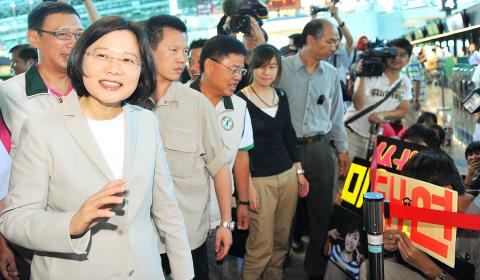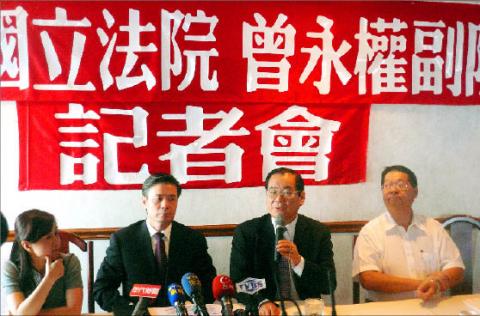Democratic Progressive Party (DPP) Chairperson Tsai Ing-wen (蔡英文) left for the US yesterday in an effort to drum up support for her presidential campaign.
At Taiwan Taoyuan International Airport, Tsai said the aim of her visit was to exchange opinions with people in the US and to establish a communication mechanism with the US administration.
If the DPP returned to power next year, the party and Taiwan could have a relationship of mutual confidence and mutual benefit with the US, and both countries could cooperate in maintaining stability in the Asia-Pacific, she said.

Photo: Yao Chieh-hsiu, Taipei Times
Tsai’s running mate, DPP -Secretary-General Su Jia-chyuan (蘇嘉全), as well as several DPP officials, saw her off at the airport.
Tsai is expected to meet US Department of State officials, including US Deputy Secretary of State for Management and Resources Thomas Nides and US Assistant Secretary of State for East Asian and Pacific Affairs Kurt Campbell, to discuss Taiwan-US and Taiwan-China relations.
Asked to comment on an interview that President Ma Ying-jeou’s (馬英九) re-election campaign office executive director King Pu-tsung (金溥聰) gave to Hong Kong-based Phoenix Television, in which King talked about the possibility of Ma visiting China, Tsai said: “A president visiting China is a very serious matter, which should be discussed by Ma himself, not a campaign official. It is a breach of government protocol.”

Photo: CNA
King, who is on a six-city tour of the US, told the TV channel that Ma did not rule out a visit to China if he were re-elected in January. Ma would make the visit in his role as Chinese Nationalist Party (KMT) chairperson, King said.
“Once the two sides have developed a tacit understanding and are capable of setting aside disputes and solving bilateral issues in a practical manner, the likelihood of this and addressing further issues improves,” King said.
“The two sides may hold more dialogues on daily affairs, culture, sports, the economy and even politics,” he said.
Given King’s controversial actions and remarks on his US trip thus far, Ma should restrain King, Tsai said.
“Mr King has recently talked about many important national affairs. I want to remind President Ma that he is running in the presidential election, not King Pu-tsung,” Tsai said.
However, Ma’s spokesman Fan Chiang Tai-chi (范姜泰基) played down King’s comments.
“As of now, there’s no such plan,” he said of the suggested cross-strait trip.
Tsai is scheduled to spend three days in Washington, where she will meet academics from several think tanks and members of Congress, as well as attend fundraising dinners organized by overseas Taiwanese communities. She will then make a short trip to Boston to give a speech at Harvard University.
After Boston, Tsai’s delegation will travel to New York City for a fundraising dinner organized by overseas Taiwanese before moving on to Houston, San Francisco and Los Angeles, which boast some of the largest Taiwanese communities in the US.
Meanwhile, King rebuffed accusations by the DPP over the weekend that his US trip was meant to “sabotage or ambush” Tsai’s visit. He said the very -suggestion was “childish.”
King told a press conference in Washington that the KMT delegation, headed by Deputy Legislative Speaker Tseng Yung-chuan (曾永權), was making the visit at the request and invitation of Taiwanese supporters of the KMT in the US.
When these KMT supporters heard that Tsai was going to visit the US, they wanted Ma to send a delegation as well so that they could express their support.
“We are here in response to the requests of people who live here,” King said.
King said there was no question of a competition with Tsai to see who could meet the more senior US officials. The KMT delegation just wanted to meet officials in charge of Asian affairs to explain Ma’s cross-strait policies and his push for a “win-win situation,” King said.
The KMT delegation arrived in Washington three days ahead of Tsai and will visit the same cities on her itinerary: Washington, New York, Boston, Houston, San Francisco and Los Angeles. While the schedules are very similar, these cities do have large Taiwanese emigre populations.
At Harvard on Thursday, King and Tsai will appear within two hours of each other. Both are expected to hold talks with Nides and Campbell.
“We want to tell our American friends that the policies of President Ma are more pragmatic than those of the DPP,” King said.
“We are moving toward a better future. The Ma government has spared no effort to improve all the domestic and economic situations and cross-strait relations,” he said.
Tseng played down the controversy over US beef imports and indicated that it would not be a major issue in the KMT delegation’s talks in Washington.
When asked if Ma would visit China if he were reelected, King said as long as Taiwan’s sovereignty and dignity were not undermined, anything “might be possible or be discussed.”
He said that he had been quoted “out of context” in reports that Ma would make such a visit and he refused to confirm whether Ma would go or not.
Another war of words between the DPP and KMT erupted yesterday over reports that Taiwanese businesspeople working in China might receive discounted air tickets to return home to vote in January’s presidential and legislative elections.
Before leaving Taipei, Tsai said determining the motivation for the discounted fares was crucial. If someone were subsidizing the discounts, then vote buying could be involved and law enforcement officials should handle the matter, she said.
However, KMT Culture and Communication Commission Director Chuang Po-chun (莊伯仲) said the discount airfare scheme was being promoted by China-based Taiwanese business associations of their own accord.
“It has been routine for many years for the associations to take the initiatives to negotiate package deals for cheaper airline tickets,” he said.
It was beneath Tsai’s dignity to make groundless vote-buying accusations against Ma and made her look like she lacked common sense, Chuang said.
Not all businesspeople based in China would vote for the KMT, Chuang said.
Additional reporting by Shih Hsiu-chuan, AFP and CNA

FALSE DOCUMENTS? Actor William Liao said he was ‘voluntarily cooperating’ with police after a suspect was accused of helping to produce false medical certificates Police yesterday questioned at least six entertainers amid allegations of evasion of compulsory military service, with Lee Chuan (李銓), a member of boy band Choc7 (超克7), and actor Daniel Chen (陳大天) among those summoned. The New Taipei City District Prosecutors’ Office in January launched an investigation into a group that was allegedly helping men dodge compulsory military service using falsified medical documents. Actor Darren Wang (王大陸) has been accused of being one of the group’s clients. As the investigation expanded, investigators at New Taipei City’s Yonghe Precinct said that other entertainers commissioned the group to obtain false documents. The main suspect, a man surnamed

DEMOGRAPHICS: Robotics is the most promising answer to looming labor woes, the long-term care system and national contingency response, an official said Taiwan is to launch a five-year plan to boost the robotics industry in a bid to address labor shortages stemming from a declining and aging population, the Executive Yuan said yesterday. The government approved the initiative, dubbed the Smart Robotics Industry Promotion Plan, via executive order, senior officials told a post-Cabinet meeting news conference in Taipei. Taiwan’s population decline would strain the economy and the nation’s ability to care for vulnerable and elderly people, said Peter Hong (洪樂文), who heads the National Science and Technology Council’s (NSTC) Department of Engineering and Technologies. Projections show that the proportion of Taiwanese 65 or older would

The government is considering polices to increase rental subsidies for people living in social housing who get married and have children, Premier Cho Jung-tai (卓榮泰) said yesterday. During an interview with the Plain Law Movement (法律白話文) podcast, Cho said that housing prices cannot be brought down overnight without affecting banks and mortgages. Therefore, the government is focusing on providing more aid for young people by taking 3 to 5 percent of urban renewal projects and zone expropriations and using that land for social housing, he said. Single people living in social housing who get married and become parents could obtain 50 percent more

Democracies must remain united in the face of a shifting geopolitical landscape, former president Tsai Ing-wen (蔡英文) told the Copenhagen Democracy Summit on Tuesday, while emphasizing the importance of Taiwan’s security to the world. “Taiwan’s security is essential to regional stability and to defending democratic values amid mounting authoritarianism,” Tsai said at the annual forum in the Danish capital. Noting a “new geopolitical landscape” in which global trade and security face “uncertainty and unpredictability,” Tsai said that democracies must remain united and be more committed to building up resilience together in the face of challenges. Resilience “allows us to absorb shocks, adapt under